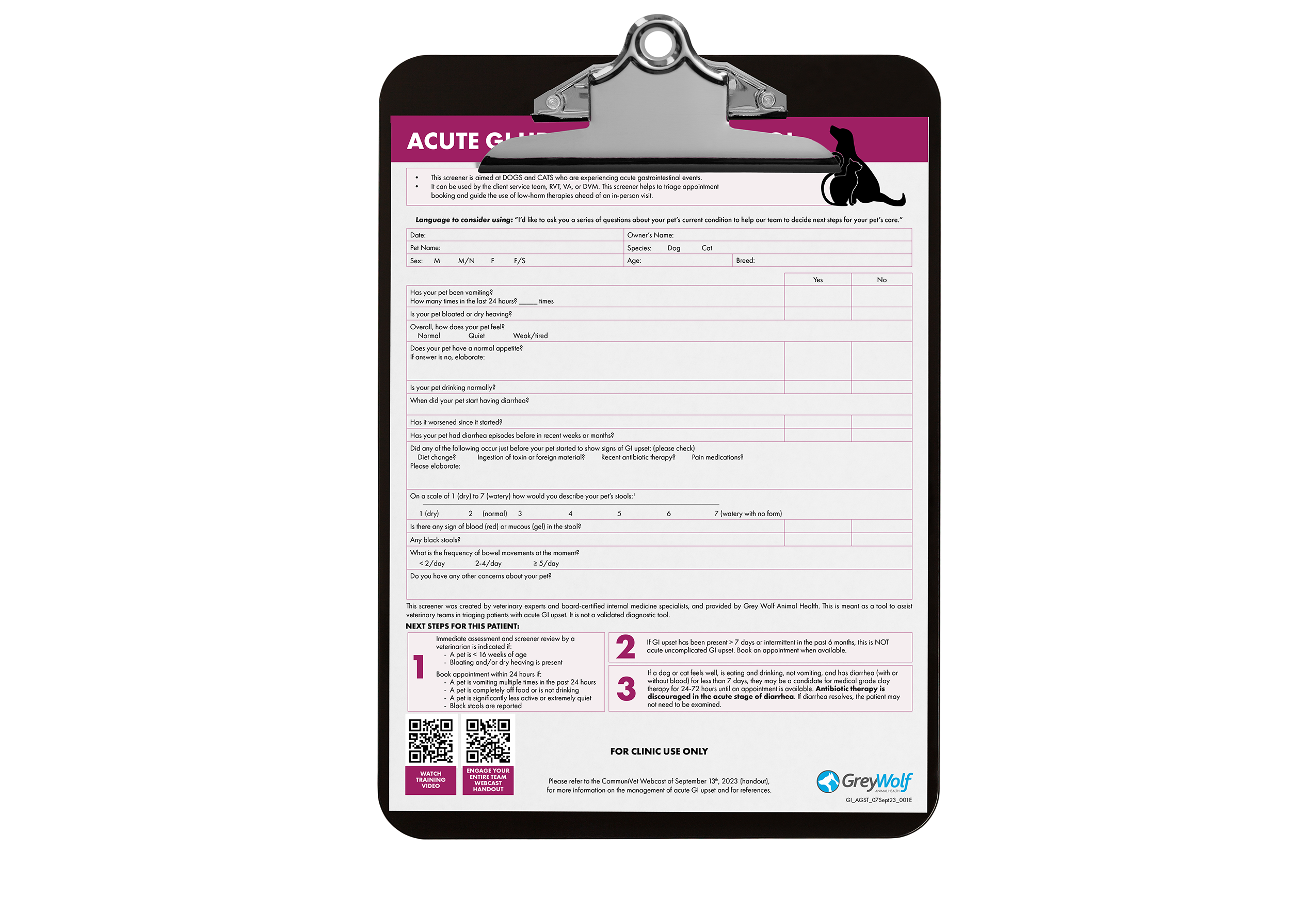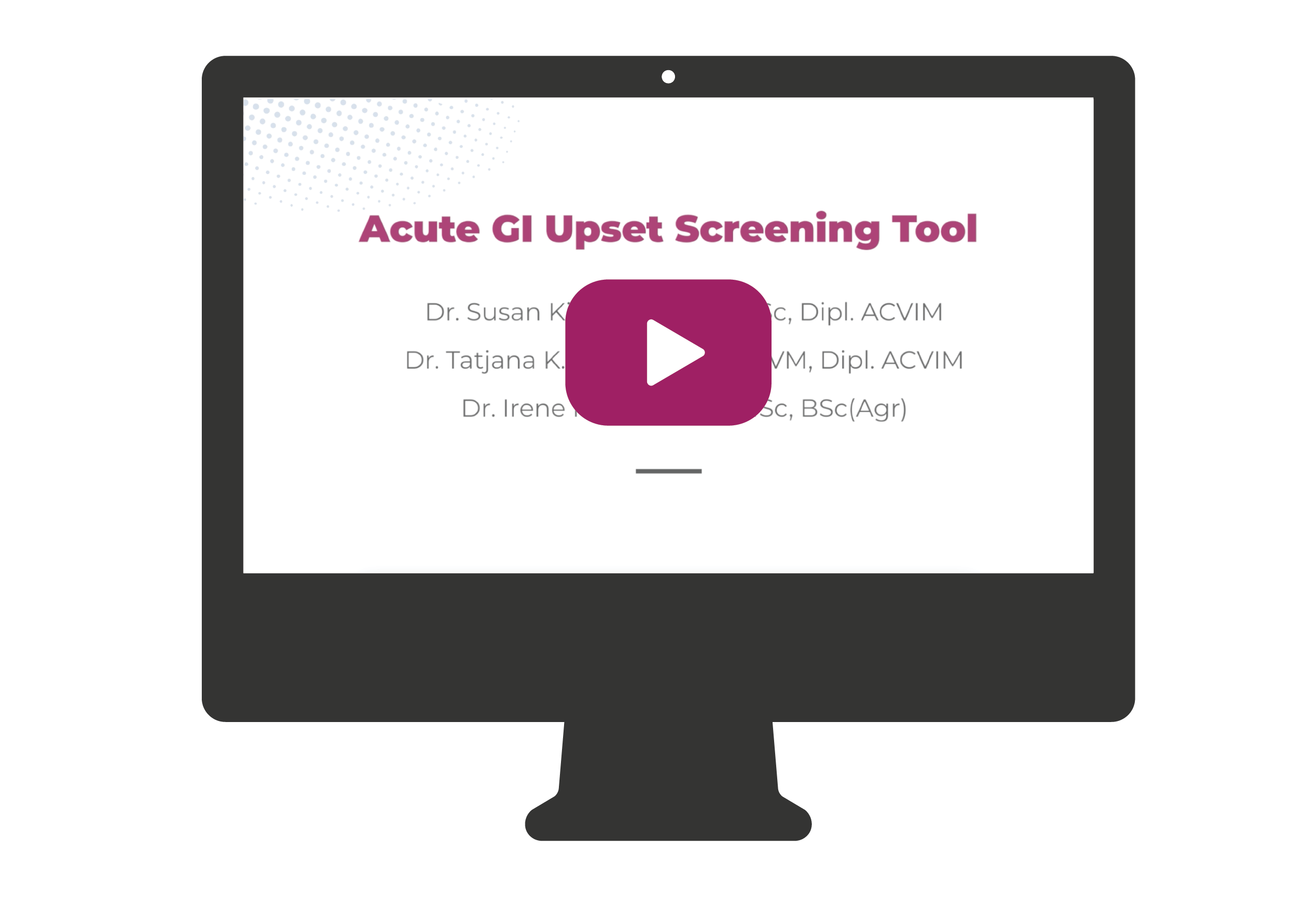FAITES PARTICIPER TOUTE VOTRE ÉQUIPE À UN CONTINUUM DE SOINS PRODUCTIF
Outils pour améliorer la prise en charge des troubles gastro-intestinaux aigus non compliqués chez les animaux de compagnie
L’outil de dépistage des troubles gastro-intestinaux aigus a été créé pour aider les DMV, les TSA, les AV et les équipes du service à la clientèle à faire le triage au moment de la prise de rendez-vous. Cet outil oriente l’utilisation de thérapies sans effet nocif avant une visite en personne.

L’outil de dépistage des troubles gastro-intestinaux aigus est destiné aux chiens et aux chats qui présentent des troubles gastro-intestinaux aigus légers et non compliqués.
Constatez par vous-même à quel point il est facile à utiliser.
Cet outil a été créé par des spécialistes en santé animale et des détenteurs de certificats de spécialistes en médecine interne et fourni par Grey Wolf Animal Health.
Cet outil diagnostique n’a pas été validé.
Cet outil diagnostique n’a pas été validé.
INVITATION À REGARDER UNE WEBÉMISSION SUR DEMANDE

Tout au long de cette webémission, des spécialistes en santé animale ayant une expertise en gastroentérologie, en maladies infectieuses et en éducation expliqueront comment faire participer toute votre équipe à la prise en charge des troubles gastro-intestinaux aigus bénins non compliqués.

Susan Kilborn
DVM, DVSc, Dipl. ACVIM

Tatjana K. Mirkovic
BSc, DVM, Dipl. ACVIM

Irene Moore
DVM, MSc, BSc (Agr)
C’est gratuit. Il suffit de deux minutes à peine pour vous inscrire.
References
- Kilborn S, Carioto L, Mirkovic T.K. (2022, March 9). Pet Parents Have Come to Expect and Even Demand Antimicrobials for Mild Acute GI Upset …How can we change the narrative? CommuniVET Webcast.
- Singleton, D. A., Noble, P., Sánchez-Vizcaíno, F., Dawson, S., Pinchbeck, G. L., Williams, N. J., Radford, A. D., & Jones, P. H. (2019). Pharmaceutical Prescription in Canine Acute Diarrhoea: A Longitudinal Electronic Health Record Analysis of First Opinion Veterinary Practices. Frontiers in veterinary science, 6, 218. https://doi.org/10.3389/fvets.2019.00218
- Shmalberg, J., Montalbano, C., Morelli, G., & Buckley, G. J. (2019). A Randomized Double Blinded Placebo-Controlled Clinical Trial of a Probiotic or Metronidazole for Acute Canine Diarrhea. Frontiers in veterinary science, 6, 163. https://doi.org/10.3389/fvets.2019.00163
- Manchester, A. C., Webb, C. B., Blake, A. B., Sarwar, F., Lidbury, J. A., Steiner, J. M., & Suchodolski, J. S. (2019). Long-term impact of tylosin on fecal microbiota and fecal bile acids of healthy dogs. Journal of veterinary internal medicine, 33(6), 2605–2617. https://doi.org/10.1111/jvim.15635
- Pilla, R., Gaschen, F. P., Barr, J. W., Olson, E., Honneffer, J., Guard, B. C., Blake, A. B., Villanueva, D., Khattab, M. R., AlShawaqfeh, M. K., Lidbury, J. A., Steiner, J. M., & Suchodolski, J. S. (2020). Effects of metronidazole on the fecal microbiome and metabolome in healthy dogs. Journal of veterinary internal medicine, 34(5), 1853–1866. https://doi.org/10.1111/jvim.15871
- Grimes, M., & Lidbury, J. (2020, February 19). Antibiotics in canine GI disease: When to use and when to ditch. DVM 360. Retrieved June 6, 2022, from https://www.dvm360.com/view/antibiotics-in-canine-gi-disease-when-to-use-and-when-to-ditch
- Maki, C.R., Allen, S., Wang, M., Ward, S.H., Rude, B.J., Bailey, H.R., Harvey, R.B., Phillips, T.D. (2017). Calcium montmorillonite clay for the reduction of aflatoxin residues in milk and dairy products. Journal of Dairy and Veterinary Sciences. 2(3):1–8.
- Barshad, I. (1952). Absorptive and Swelling Properties of Clay-Water System. Clays Clay Miner. 1, 70–77. https://doi.org/10.1346/CCMN.1952.0010108
- Williams, L. B., & Haydel, S. E. (2010). Evaluation of the medicinal use of clay minerals as antibacterial agents. International geology review, 52(7/8), 745–770. https://doi.org/10.1080/00206811003679737
- Adamis, Z., Williams, R. B. (2005). Bentonite, kaolin and selected clay minerals. [Report]. Environmental health criteria, 231. World Health Organization. https://apps.who.int/iris/handle/10665/43102
- Fournier, Q., Serra, J. C., Williams, C., & Bavcar, S. (2021). Chemotherapy-induced diarrhoea in dogs and its management with smectite: Results of a monocentric open-label randomized clinical trial. Veterinary and comparative oncology, 19(1), 25–33. https://doi.org/10.1111/vco.12631
- Hahn, K. A., Carpenter, R. H. (2008). Calcium Aluminosilicate (CAS) in the Treatment of Intractable Diarrhea in Dogs with Cancer. Intern J Appl Res Vet Med, 6(3):181–184.
- Khediri, F., Mrad, A. I., Azzouz, M., Doughi, H., Najjar, T., Mathiex-Fortunet, H., Garnier, P., & Cortot, A. (2011). Efficacy of diosmectite (smecta) in the treatment of acute watery diarrhoea in adults: a multicentre, randomized, double-blind, placebo-controlled, parallel group study. Gastroenterology research and practice, 2011, 783196. https://doi.org/10.1155/2011/783196
- Carioto L, Kilborn S, Mirkovic T.K. (2022, September 28). Changing the narrative. Tools for reducing use of antimicrobials for GI conditions in companion animals. CommuniVET Webcast.
- Rudinsky, A. J., Rowe, J. C., & Parker, V. J. (2018). Nutritional management of chronic enteropathies in dogs and cats. Journal of the American Veterinary Medical Association, 253(5), 570–578. https://doi.org/10.2460/javma.253.5.570
- Lenox C. E. (2021). Nutritional Management for Dogs and Cats with Gastrointestinal Diseases. The Veterinary clinics of North America. Small animal practice, 51(3), 669–684. https://doi.org/10.1016/j.cvsm.2021.01.006
- Linder, D. (2022, February 11). Featuring fiber: Understanding types of fiber and clinical uses. Today’s Veterinary Practice. Retrieved June 6, 2022, from https://todaysveterinarypractice.com/nutrition/understanding-types-fiber-clinical-uses/
- Alonso-Cotoner, C., Abril-Gil, M., Albert-Bayo, M., Mall, J. G., Expósito, E., González-Castro, A. M., Lobo, B., & Santos, J. (2021). The Role of Purported Mucoprotectants in Dealing with Irritable Bowel Syndrome, Functional Diarrhea, and Other Chronic Diarrheal Disorders in Adults. Advances in therapy, 38(5), 2054–2076. https://doi.org/10.1007/s12325-021-01676-z
- Da Silva, K., Guilly, S., Thirion, F., Le Chatelier, E., Pons, N., Roume, H., Quinquis, B., Ehrlich, S. D., Bekkat, N., Mathiex-Fortunet, H., Sokol, H., & Doré, J. (2022). Long-term diosmectite use does not alter the gut microbiota in adults with chronic diarrhea. BMC microbiology, 22(1), 54. https://doi.org/10.1186/s12866-022-02464-7
- Frey, E., Costin, M., Granick, J., Kornya, M., & Weese, J. S. (2022). 2022 AAFP/AAHA Antimicrobial Stewardship Guidelines. Journal of the American Animal Hospital Association, 58(4), 1–5. https://doi.org/10.5326/1547-3317-58.4.1
- Marks, S. L., Rankin, S. C., Byrne, B. A., & Weese, J. S. (2011). Enteropathogenic bacteria in dogs and cats: diagnosis, epidemiology, treatment, and control. Journal of veterinary internal medicine, 25(6), 1195–1208. https://doi.org/10.1111/j.1939-1676.2011.00821.x
Questions?
We’ve got answers! Contact your local Grey Wolf Animal Health rep or call 1-844-400-GWAH (4924).
To learn more, visit greywolfah.com.


